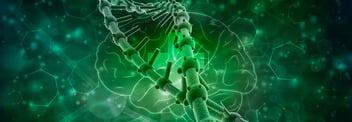The BDNF Gene: Using Your Genes to Nourish your Mental Health
- Home
- Blog

Reader, when’s the last time you stepped out of the city and into the Great Outdoors? During the pandemic, the splendors of nature beckoned like never before. As the world around us shut down and grew smaller, the green spaces within our midst gave our souls a chance to expand beyond our home’s four walls. Indeed, these natural connections provided a kind of silver lining during this otherwise dire time in history: as humankind struggled, the natural world reminded us what it means to flourish. If given the choice, most of us would choose to live in a world of abundance, rather than a world of scarcity.
In this blog, I want to show you how harnessing the power of your genes enables you to make this very choice for yourself and your mental health, on a daily basis… and it all starts by learning a little bit more about a key gene called BDNF.
BDNF: The Fertilizer Gene
Your BDNF gene is responsible for making a protein that enables both the survival and growth of your brain cells and the synapses that connect them. Shorthand for “Brain Derived Neurotrophic Factor”, BDNF protein promotes healthy cognitive functioning, produces critical neurotransmitters that keep us balanced and well, and improves our executive functioning. I like to call BDNF the “fertilizer gene”, because this one gene can mark the difference between “scarcity” and “abundance” in our brains. Without good fertilizer, crucial connections within your brain can suffer. But by promoting greater expression of this root cause gene through good behavioral and physical habits, you can help your brain’s connectivity flourish and thrive—just like nature!
Have you ever heard or read about our brain’s “plasticity”? This is the term used to describe our brain’s incredible ability to adapt to new circumstances, learn new things, and forget the old things that no longer serve us. On a biological level “plasticity” is what happens when certain cells communicate with one another to form new connections. BDNF is a core component of our brain’s plasticity, and as such, is responsible for everything from creativity, memory, comprehension, and even mood stability. If you wish you had more of any of these traits, then nourishing your BDNF gene is the key to your goals.
Using BDNF to Support Your Mental Health
At Potomac Psychiatry, we recommend you begin learning about your “fertilizer gene” by taking a genetic test, which can tell you your BDNF baseline. Some patients may have a genetic predisposition for a low level of BDNF, for instance, while others may naturally have higher levels of the same substance.
A number of external and internal stressors coming from our Mental Health Ecosystem can produce low levels of BDNF in the brain, and Root Cause Analysis can determine which ones, and what to do about them. From that analysis, you and your psychiatrist can determine what dietary, lifestyle, and supplement changes you can commit to making in order to create more fertilizer for those wonderful brain connections to grow and flourish.
In general, these interventions may include exercise, which has been proven to promote greater expression of this gene, or an altered diet—a ketogenic diet shows great promise in its ability to boost BDNF levels. Omega 3, Lithium, and other supplements and medications can also increase BDNF. Elimination of the root causes detected through specialized laboratory testing can also boost this most important brain nourisher and protector.
Nature’s beauty reminds us all of the great difference between surviving and truly thriving. Give your mental health a chance to thrive by fertilizing the roots of your brain’s incredible ecosystem with BDNF!
.png?width=144&height=144&name=Untitled%20design%20(34).png)



